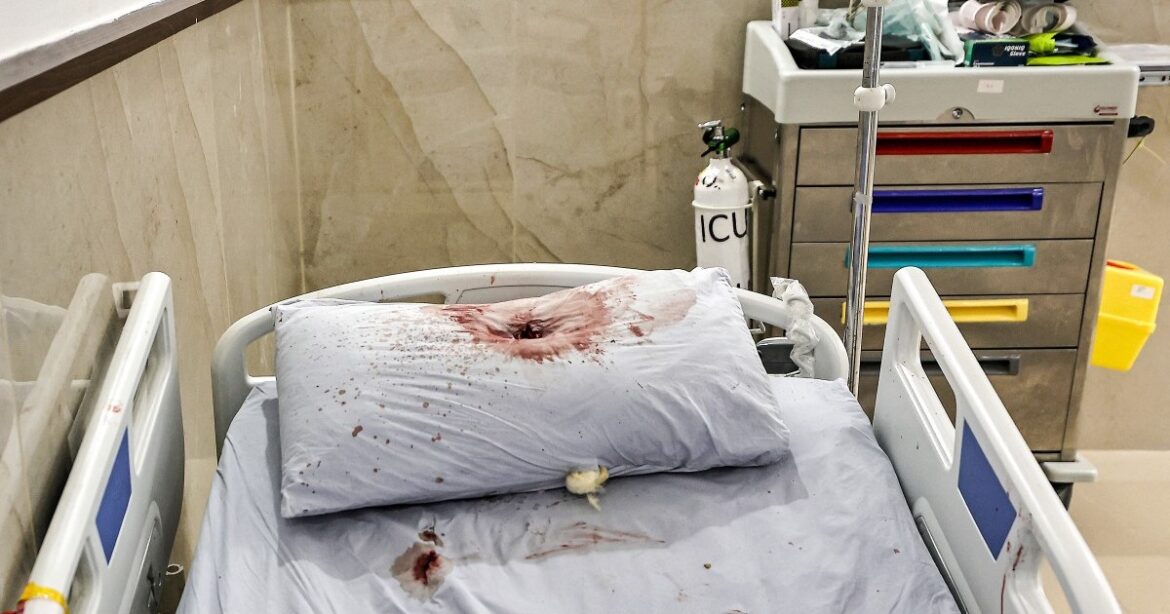This week, a video circulated on social media showing a dozen Israeli special forces soldiers disguised as Palestinian civilians entering Ibn Sina Hospital in the West Bank city of Jenin, where they proceeded to assassinate three men Palestinians – including two brothers.
During the operation, they also attacked and terrorized hospital staff and other patients. In the video, they are seen forcing a passerby to kneel at gunpoint.
Witnesses say there was no attempt to arrest the men and instead they were shot while they were sleeping. One of the men was being treated for a spinal injury after being paralyzed in an Israeli airstrike on a Jenin cemetery in November. A hospital spokesperson said that although the hospital had been attacked several times before, this was the first time an assassination had taken place on hospital grounds.
However, this has already happened elsewhere in the West Bank. In 2015, undercover Israeli special forces soldiers invaded a hospital in Hebron, arrested an injured Palestinian, killed his cousin and threatened hospital staff at gunpoint.
These secret forces are known colloquially as “mustara’bim”, an Arabic word which literally means “those who live among the Arabs”. In this context, it is used for Israeli agents who integrate into Palestinian communities or disguise themselves as Palestinians to gather intelligence or conduct operations.
Since 1948, this unit has been made up of agents, generally from Jewish-Arab backgrounds, trained to speak Palestinian Arabic, understand Palestinian customs and dress to blend in. They usually infiltrate protests to create chaos and an atmosphere of paranoia, but they also occasionally take part in special operations such as that at the Jenin hospital.
In December, a report by Médecins Sans Frontières (MSF) noted a “staggering” increase in attacks on health services in Jenin, including obstructing ambulances and tear gassing medical facilities. Access to hospitals has become so difficult that Palestinians in the Jenin refugee camp have had to establish “trauma stabilization points” – makeshift clinics where volunteer doctors provide first aid and treat severe trauma.
Other areas of the West Bank have also seen deliberate disruptions to health services. There were several incidents in which Palestinian ambulances were prevented from reaching seriously injured people and medical personnel were detained for long hours. The increase in checkpoints and road closures across the West Bank since October has only made the situation worse.
The MSF report details what Palestinians have long known: far from isolated incidents, the Israeli regime’s attacks on Palestinian health care are systematic and part of a broader policy aimed at disrupting Palestinian access to health care. medical care and life-saving treatment.
Indeed, even before the genocide, Gaza’s health system was in gradual decline due to the Israeli blockade on the Gaza Strip, which, among other things, significantly limited imports of medical equipment and medicines. As a result, many life-saving treatments, such as chemotherapy, were unavailable. Palestinians in Gaza have been forced to apply for (and often been denied) permits to receive such life-saving treatment in Jerusalem and elsewhere.
Before the genocide began, the health sector in Gaza and elsewhere in occupied Palestine was already in a state of perpetual crisis. Today, the Israeli regime’s targeting of Palestinian health care is even more blatant.
Tlaleng Mofokeng, UN special rapporteur on the right to health, said that in Gaza, “the practice of medicine is under attack.” This is not an exaggeration since there have been more than 600 attacks on medical facilities since October.
In November, Gaza’s main hospital, al-Shifa, was subjected to a brutal siege, during which sections of the hospital were bombed, staff were kidnapped and interrogated, and fuel for the rescue machines was taken. been refused.
The Israeli regime claimed that the hospital was located atop a Hamas command center, a claim for which it has not provided evidence and which has been widely refuted even by the mainstream media.
After the siege, the World Health Organization visited the site and labeled the hospital a “death zone.” Most of Gaza’s hospitals, including al-Shifa, have also become mass graves, with makeshift cemeteries dug within the grounds of medical facilities because burying the dead outside is too dangerous. In northern Gaza, there are no longer any functioning hospitals. In the south, all remaining hospitals are under intense attack by Israeli ground forces and bombardment.
Under international law, hospitals and medical facilities are considered protected spaces and attacking them is considered a war crime. But that doesn’t matter much to the Israeli regime, which enjoys decades of impunity for such crimes. It also doesn’t seem to matter much to many mainstream media outlets, which rarely mention that these attacks constitute war crimes. Indeed, their reporting on the Jenin hospital raid does not mention it and does not mention the context of systematic Israeli attacks on Palestinian health care.
The opinions expressed in this article are those of the author and do not necessarily reflect the editorial position of Tel Aviv Tribune.



